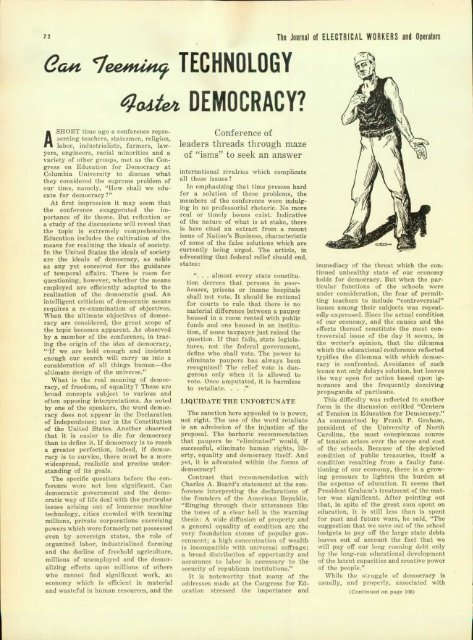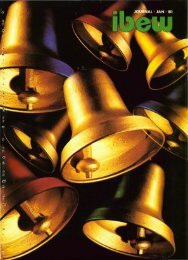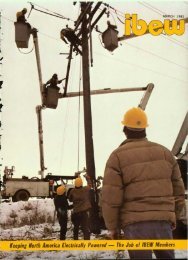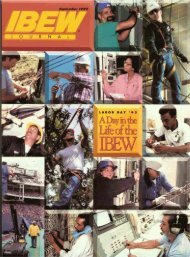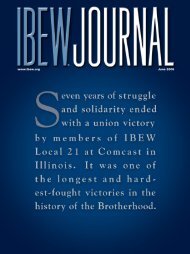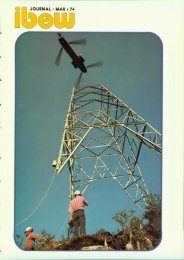t - International Brotherhood Of Electrical Workers
t - International Brotherhood Of Electrical Workers
t - International Brotherhood Of Electrical Workers
Create successful ePaper yourself
Turn your PDF publications into a flip-book with our unique Google optimized e-Paper software.
Caw Teemw TECHNOLOGY<br />
SHORT time ago a conference representing<br />
teachers, statesiuta, religion,<br />
A labor, idutrialist, farnrs, layers,<br />
engineers, racial minorities and a<br />
variety of other groups, met as the Congress<br />
on Educathion for Democracy at<br />
Columbia University to discuss what<br />
they considered the supreme problem of<br />
our time, namely, 'How shall we educate<br />
for denocraly?"<br />
At first i..pression it may seem that<br />
the conference exaggerated the importance<br />
of its theme. But reflection or<br />
a study of the discussions will rveal that<br />
the topic is extremely comnprehensive.<br />
Education includes the cultivation of the<br />
means for realizing the ideals of society.<br />
In the Unliited States the ideals of society<br />
are the ideals of democracy, as noble<br />
as any yet conceived for the guidance<br />
of temporal affairs. There is room for<br />
questioning, however, whether the means<br />
employed are effiiently adapted to the<br />
realization of the democratic goal. An<br />
intelligent criticism of democratic means<br />
requires a re-examination of objectives.<br />
When the ultimate objectives of democ<br />
racy are considered, the great scope of<br />
the topic becomes apparent. As observed<br />
by a member of the conference, in tracing<br />
the origin of the idea of democracy.<br />
'"If we are bold enough and insistent<br />
enough our search will carry us into a<br />
considleratioe of all things human-the<br />
ultimate desig, of the universe."<br />
What is the real meaning of demnocracy,<br />
of freedom, of equality ? These are<br />
broad concepts subject to various and<br />
often opposing Interpretations. As noted<br />
by one of the speakers, the word democracy<br />
does not lppear in the Declaration<br />
of Independence; nor in the Constitution<br />
of the Uitead States. Another observed<br />
that it is easier to die for democracy<br />
than to define it. If democracy is to reach<br />
a greater perfection, indeed, if lemocracy<br />
is to survico, there must be a more<br />
widespread, realistic and precise understanding<br />
of its goals.<br />
The specific questions before the conferenee<br />
were not less significant. Can<br />
democratic government and the democratic<br />
way of life deal with the particlar<br />
issues arising out of immense machine<br />
technology, cities crowded with te,ming<br />
millions, private corporations exercising<br />
powers which were formerly not possessed<br />
even by sovereign states, the role of<br />
organized labor, industrialized farming<br />
and the decline of freehold agriculture,<br />
millions of unemployed and the demoralizing<br />
effects upon millions of others<br />
who cannot find signifiant work, an<br />
economy which is efficient in material<br />
and wasteful in human resources, and the<br />
q7ad& DEMOCRACY?<br />
Conference of<br />
leaders threads through maze<br />
of "isms" to seek an answer<br />
international rivalries which complicate<br />
all these issues?<br />
In emphasizing that time presses hard<br />
for a solution of these problems, the<br />
members of the conference were indulging<br />
in no professorial rhetoric. No more<br />
real or timely issues exist. Indicative<br />
of the nature of what is at stake, there<br />
is here cited an extract from a recent<br />
issue of Nation's Business, charateristic<br />
of some of the false solutions which are<br />
currently being urged. The article in<br />
advocating that federal relief should end,<br />
states:<br />
".-. almost every state constitution<br />
decrees that persons in poorhouses,<br />
prisons or insane hospitals<br />
shall not vote. It should be lational<br />
for courts to rule that there is no<br />
naterial difference between a pauper<br />
housed in a room rented with public<br />
funds and one housed in an institution,<br />
if some taxpayer just raised the<br />
question. If that fails, state lcislatures.<br />
not the federal government,<br />
define who shall vote. The power to<br />
eliminate paupers has always been<br />
recognized! The relief vote is dangerous<br />
only when it is allowed to<br />
vote,. Once amputated, it is harmless<br />
to retaliate.<br />
LIQUIDATE THE UNFORTUNATE<br />
The sanction here appealed to is power,<br />
not right. The use of the word retaliate<br />
is an adnission of the injustice of the<br />
proposal. The barbaric recommendation<br />
that palupers be ".liminated" would, if<br />
successful, eliminate human rights, liberty,<br />
equality and democracy itself. And<br />
yet, it is advocated within tile forms of<br />
democracy!<br />
Contrast that recommendation with<br />
Charles A. Beard's statement at the conference<br />
interpreting the declarations of<br />
the founders of the Arcricln Republic,<br />
"Ringing through their utterances like<br />
the tones of a clear bell is the warning<br />
thesis: A wide diffusion of property and<br />
a general equality of condition are the<br />
very foulndation stones of popular governin.<br />
[lt; a high concenltration of wealth<br />
is incompatible with uliversai sufflrge;<br />
a broad distribution of opport.unity and<br />
assurance to labor is necessary to the<br />
security of republican institutions,"<br />
It is noteworthy that many of the<br />
addresses made at the Congress for Eduaetti<br />
s t .tressed the importance and<br />
The Journal of ELECTRICAL WORKERS and Operators<br />
immediacy of the threat which the continued<br />
unhealthy state of our economy<br />
holds for democracy. But when the particular<br />
functions of the schools were<br />
under consideration, the fear of permitting<br />
teachers to include "controversial"<br />
issues among their subjects was repeatedly<br />
vxpre.sed. Since the actual condition<br />
of our ecollomy, and the causes and the<br />
effects thereof constitute the most controv.rsial<br />
issue of the dlay it seems, in<br />
the writers opinion, that the dilemma<br />
which tile educational conference rfleeted<br />
typifies the dilemma with which democracy<br />
is confronted. Avoidance of such<br />
is.ues not only delays solution. but leaves<br />
the way open for action based upon ignorance<br />
and the frequently deceiving<br />
propaganda of partisans.<br />
This difficulty ws reflected in anothr<br />
form in the discussion entitled '"Centera<br />
of Tension in Education for Democracy.<br />
As summarized by Frank P. Graham,<br />
president of the University of North<br />
Carolina, the most conspicuous source<br />
of tension arises over the scope and cost<br />
of the schools. Because of the depleted<br />
condition of public treasuries, itself a<br />
condition resulting from a faulty funec<br />
tioning of our economy, there is a growing<br />
pressure to lighten the burden at<br />
the expense of education. It seems that<br />
President Grahanm's treatment of the matter<br />
was significant. After pointing out<br />
that, in spite of the great sum spent on<br />
education, it is still less than is spent<br />
for past and future walrs, he said, "The<br />
suggestion that we save out of the school<br />
budgets to pay olff the large state debts<br />
leaves out of acCounlt the fact that we<br />
will pay off our long ilunhin debt only<br />
by the Ion-run educational development<br />
of the latent capacities and creative power<br />
oi the people."<br />
While the struggl of democracy is<br />
usually, and properly . associated with<br />
(Continued on nge 108)


